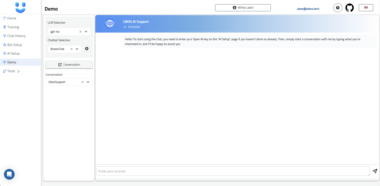Overview of MCP Server for MongoDB Atlas
The MCP (Model Context Protocol) server for MongoDB Atlas is an integral tool for developers and businesses looking to streamline their database management processes. By leveraging the capabilities of MCP servers, users can efficiently manage MongoDB Atlas clusters, users, and network access, all through a standardized protocol. This tool is particularly beneficial for organizations that require seamless integration of AI models with external data sources.
Key Features
- Cluster Management: Easily create and manage MongoDB Atlas clusters within existing projects. This feature ensures that businesses can scale their database infrastructure as needed.
- Network Access Configuration: With the
setup_atlas_network_accesstool, users can configure network access settings to ensure secure and efficient data handling. - User Management: The ability to create new database users with the
atlasAdminrole ensures that only authorized personnel can access sensitive data. - Connection Strings Retrieval: Quickly retrieve connection strings for clusters, simplifying the process of connecting applications to databases.
- Project and Cluster Listing: Easily list all accessible Atlas projects and clusters, providing a comprehensive view of the database landscape.
Use Cases
- Enterprise Data Management: For businesses that rely on MongoDB Atlas for their data storage needs, the MCP server provides a robust solution for managing multiple clusters and users.
- AI Model Integration: By acting as a bridge, the MCP server allows AI models to access and interact with data stored in MongoDB Atlas, facilitating advanced analytics and decision-making processes.
- Secure Data Handling: With network access configuration and user management features, organizations can ensure that their data is handled securely and efficiently.
UBOS Platform Integration
UBOS, a full-stack AI Agent Development Platform, enhances the capabilities of the MCP server by providing a comprehensive environment for AI agent orchestration. With UBOS, businesses can connect AI agents with enterprise data, build custom AI agents using LLM models, and implement multi-agent systems. This integration ensures that organizations can leverage the full potential of AI to drive business growth and innovation.
Why Choose UBOS and MCP Server?
- Scalability: Both the MCP server and UBOS platform are designed to scale with your business, ensuring that you can accommodate growing data needs and AI model complexities.
- Efficiency: Streamline database management tasks and AI model integration processes, reducing the time and effort required to maintain your data infrastructure.
- Security: With robust security features, you can be confident that your data is protected against unauthorized access and breaches.
- Innovation: Leverage the latest AI technologies and database management tools to stay ahead of the competition and drive innovation within your organization.
In conclusion, the MCP server for MongoDB Atlas, combined with the UBOS platform, offers a powerful solution for businesses looking to enhance their data management and AI integration capabilities. Whether you’re managing a single cluster or orchestrating complex AI agents, these tools provide the flexibility and functionality needed to succeed in today’s data-driven world.
MongoDB Atlas Project Manager
Project Details
- mongodb-developer/mcp-mongodb-atlas
- mcp-mongodb-atlas
- MIT License
- Last Updated: 4/14/2025
Categories
Recomended MCP Servers
A docker MCP Server (modelcontextprotocol)
Official MiniMax Model Context Protocol (MCP) server that enables interaction with powerful Text to Speech and video generation...

A Model Context Protocol (MCP) server for Apache Dolphinscheduler. This provides access to your Apache Dolphinshcheduler RESTful API...

Terraform Registry MCP Server

The gateway for GenAI systems to interact with multiple Kubernetes clusters through the MCP
A Model Context Protocol (MCP) server that integrates AI assistants with the Terraform Cloud API, allowing you to...
MCP server providing a knowledge graph implementation with semantic search capabilities powered by Qdrant vector database

 From vibe coding to vibe deployment. UBOS MCP turns ideas into infra with one message.
From vibe coding to vibe deployment. UBOS MCP turns ideas into infra with one message.






